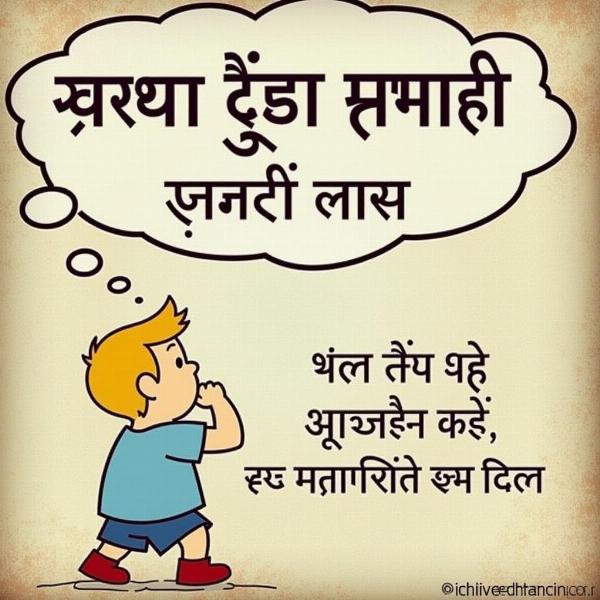Understanding the concept of “imagination” and its various nuances in Hindi can be enriching. This article explores the different ways to express “imagination” in Hindi, delving into its cultural significance and providing practical examples to solidify your understanding of this powerful concept. We will also look at related terms and phrases, offering a comprehensive overview of how “imagination in Hindi meaning” is used in everyday conversations and literature.
Exploring the Hindi Equivalents of “Imagination”
The most common Hindi word for “imagination” is kalpana (कल्पना). This word encapsulates the act of forming new ideas or images, especially mentally. It’s a versatile term used in various contexts, from describing children’s fantasies to discussing complex scientific theories. Another frequently used word is manokalpana (मनोकल्पना), which literally translates to “mind creation,” further emphasizing the mental process involved in imagining.
 Hindi Word for Imagination
Hindi Word for Imagination
Besides these primary terms, other words convey similar meanings, enriching the Hindi language’s ability to express different shades of imagination. Khayal (ख्याल) refers to a thought, idea, or notion, often used in the context of daydreaming or fanciful thinking. Tasavvur (तसव्वुर) carries a slightly more abstract connotation, referring to a mental image or concept, often related to visualizing something unseen.
The Cultural Significance of Imagination in India
Imagination holds a prominent place in Indian culture, deeply intertwined with storytelling, mythology, and artistic expression. From ancient epics like the Ramayana and Mahabharata to vibrant Bollywood films, imagination fuels narratives and transports audiences to fantastical realms. Traditional art forms like painting, sculpture, and dance often draw inspiration from mythological stories and imaginative interpretations of the world.
Practical Applications of “Imagination” in Hindi
Let’s explore some practical examples of how “imagination” and related terms are used in everyday Hindi conversations:
- “Bachchon ki kalpana shakti bahut tez hoti hai” (बच्चों की कल्पना शक्ति बहुत तेज़ होती है): Children have very vivid imaginations.
- “Kya tum iski manokalpana kar sakte ho?” (क्या तुम इसकी मनोकल्पना कर सकते हो?): Can you imagine this?
- “Mera khayal hai ki yah sahi nahin hai” (मेरा ख्याल है कि यह सही नहीं है): I think this is not right (using “khayal” in the context of an opinion or thought).
Imagination is More Important than Knowledge Meaning in Hindi
The famous quote by Albert Einstein, “Imagination is more important than knowledge,” resonates deeply, even in Hindi. It translates to “Kalpana, gyan se adhik mahatvpurn hai” (कल्पना, ज्ञान से अधिक महत्वपूर्ण है). This phrase emphasizes the power of imagination to drive innovation, creativity, and progress. While knowledge provides a foundation, imagination allows us to build upon it, exploring new possibilities and pushing the boundaries of what we know.
Conclusion
Understanding the meaning and usage of “imagination in Hindi meaning” opens a window into the richness of the Hindi language and the cultural context in which it thrives. From kalpana and manokalpana to khayal and tasavvur, these words offer nuanced ways to express the power of imagination. Whether discussing children’s fantasies or complex philosophical concepts, a grasp of these terms allows for clearer communication and a deeper appreciation of Indian culture. Remember, kalpana is the key to unlocking creativity and innovation.
FAQ
- What is the most common Hindi word for “imagination”? Kalpana (कल्पना) is the most commonly used word.
- What is the literal meaning of manokalpana? Manokalpana literally translates to “mind creation.”
- How is imagination viewed in Indian culture? Imagination is highly valued in Indian culture, playing a central role in storytelling, art, and mythology.
- How do you say “Children have vivid imaginations” in Hindi? “Bachchon ki kalpana shakti bahut tez hoti hai” (बच्चों की कल्पना शक्ति बहुत तेज़ होती है).
- What is the Hindi translation of “Imagination is more important than knowledge”? “Kalpana, gyan se adhik mahatvpurn hai” (कल्पना, ज्ञान से अधिक महत्वपूर्ण है).
Meaning-Hindi.in is your one-stop solution for all your Hindi translation needs. We offer a wide range of professional translation services, including business and commercial document translation, certified and legal document translation, technical and user manual translation, website and localization services, and academic and educational material translation. Our expertise also covers specialized fields, ensuring accurate and culturally sensitive translations. We also provide express translation services for urgent requests. Contact us today at [email protected] or call us at +91 11-4502-7584. Meaning-Hindi.in is committed to delivering high-quality, reliable translations that bridge language barriers and facilitate effective communication.